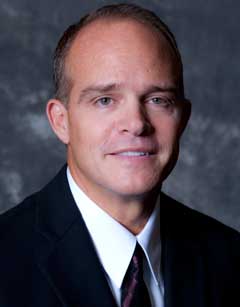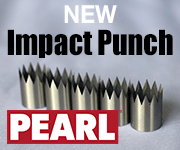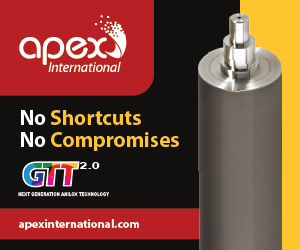Experience Speaks | Rex Lane
- Published: May 17, 2012
 Rex Lane
Rex Lane- CEO
- WS Packaging Group
- Green Bay, WI
- Founded: October 2000 with the merger of Wisconsin Label Corp., founded in 1966, and Superior Label Systems Inc., founded in 1970
- 16 facilities in the US and Mexico; 1,800 employees
- Specialization: predominantly pressure-sensitive label converting
- Website: www.wspackaging.com
1. How did you get into the converting business? When Terry Fulwiler, from the founding family, retired as CEO, the company started a search for someone with strong lean manufacturing background. I had that, although I had no experience in paper, labels, or converting. In August 2010 I came aboard as CEO, so all my experience with converting has been with this company.
2. How would you describe your management style? Leadership through accountability.
3. What is your key to retaining good employees? First of all, people work for people. If you have a good solid business and good solid leadership skills, and if you run a business in an ethical way, people will want to work for you.
4. What is the key to growing a business in a bad economy? Be aggressive and opportunistic. The best companies will thrive in a down economy. They can attack the marketplace and competition in ways that struggling companies can’t. If you’re a good company and financially stable, do what you can do to grow through acquisition, capital investment, organic growth, or technology. Do the necessary things during the bad times, and they will help you when you come into a good period.
5. What is the biggest threat to the converting industry right now? A combination of the recovering economy and the inflationary impact. Our customers are looking for ways to cut costs, and it’s turning into a commodity-type environment. That’s what we don’t want to see because we offer so much more.
6. To what associations does your company belong? TLMI is the main one that comes to mind. We participate on a regular basis, and we get a lot of insight from their biannual meetings.
7. How do you handle a difficult customer? Listen first. Deal with facts. Remove the emotion. Come up with an action plan we can both agree upon. Put that plan into effect. Mainly, it comes down to effective communication. When we do that, the customer tends to walk away with confidence that we understand their needs. That has worked extremely well for us.
8. Are there any management or business books that have influenced you? Good to Great by Jim Collins. Also, The Gold Mine: A Novel of Lean Turnaround by Freddy Balle and Michael Balle. One that is required reading around here is Toyota Production System: Beyond Large-Scale Production by Taiichi Ohno and Norman Bodek.
9. What is the biggest mistake you made in business and how did you fix it? When I came to WS Packaging I probably did too much too fast to change things. I wanted to implement a system they weren’t used to, pushing too many new tools and different ways to look at things. We’ve adjusted as we’ve gone along, but if I had it to do over, I would have gone more slowly and been more aware of the training and knowledge gaps I was dealing with.
10. What do you enjoy most about your job? I love the fact that we’re changing our culture significantly from being a moderate-sized, family-owned business into a much larger corporate structure with a very methodical way of doing business. The growth opportunities in this company and this industry—through technology, organic growth, acquisitions, etc.—are exceptional. All these things make you want to go to work and do a good job.
11. What do you enjoy least about your job? Part of changing a culture is that some people just don’t fit. When a reorganization model is implemented, you have to get the right people in the right places. There will be some casualties.
12. What advice would you give to someone starting out in this business? If you’re going to start your own small business, don’t! You’re going to get swallowed up. If you want to get into the industry itself working for a company, start with a company that is stable and large enough to survive.
13. What are you most proud of in your business? The culture change we’ve talked about. And the manufacturing floor is only part of it. What I’m really most proud of is our trademarked IMPACT Business System that covers our everyday decision-making and benefits entire supply chain. It’s very robust, very detailed, and it touches every single thing we do including finance quoting, order entry, running presses, changeover times, material waste, product quality, inventory. We’re seeing enormous success with this.
14. Do you have a personal hero? Definitely Peyton Manning. I’m from Knoxville, TN. Peyton went to college there and was a huge influence. He’s a model citizen, a great athlete, and a great role model. Everything he does is by the books.
15. Any hobbies or outside interests you care to talk about? I’m a big football fan. And even though I live in Green Bay, I’m not necessarily a Packers fan. When I came to this company, the CEO’s office had Green Bay Packer carpet. I was forbidden from removing it until the Packers were either out of the playoffs or won the Super bowl. Well, they won the Super bowl, and two weeks after that, the carpet came out.
16. Do you have a personal motto or mantra by which you live life or do business? Work hard and play hard.
17. What does your company do for your customers that makes them come back to enjoy the experience of doing business with you again? We offer innovative solutions and develop partnerships. We don’t want to be a commodity supplier, we want to work customers because we have significant opportunities to help them succeed. We offer a vast array of products, not just pressure-sensitive. We are able to manufacture any type of label in any size.
18. What do you feel are the key qualities necessary to be a successful leader? It goes back to what I said about my leadership style. Make the tough decisions and be accountable for those decisions. Last year we made some layoffs and cutbacks, and I went around to every single plant and had a Q&A session with the employees, explaining why we did what we did and what it means to future of the company.
19. What sustainability efforts has your company made? Two of our sites are L.I.F.E. [Label Initiative for the Environment] certified through TLMI, and many more are working toward that. That goes along with waste reduction, efforts to ensure our waste streams are clean, and other green initiatives.












